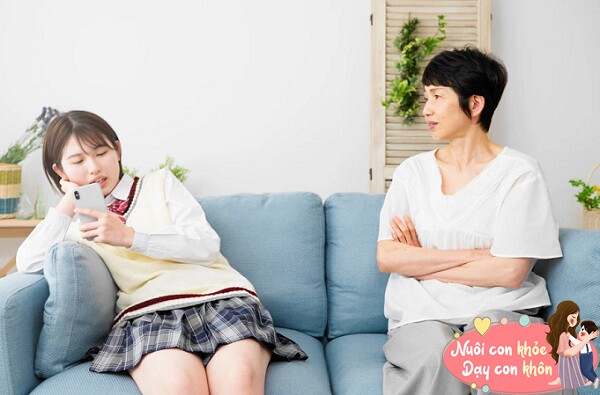As children enter their teenage years, they start to become attracted to the opposite sex, and their personalities can change unpredictably. This is a common issue that teenagers face during puberty.
According to psychologists, parents should remain calm and react appropriately in such situations, trying to understand the reasons behind their child’s behavior. Then, with patience, they can guide and support their child through this special phase smoothly.
Ms. Jinrong from China has a 15-year-old daughter, Ajin, who is usually quiet and well-behaved, and excels in her studies, always ranking at the top of her class.
One weekend, as Jinrong was at home as usual, she thought her daughter was studying in her room, so she didn’t disturb her.

As lunchtime approached, Jinrong went to her daughter’s room, and as she opened the door, she noticed something strange. Her daughter was sitting at her desk, looking very unusual, with flushed cheeks and a frightened look in her eyes.
When Jinrong appeared, her daughter seemed startled and quickly grabbed a book from the desk to cover her phone.
At that moment, Jinrong’s heart raced, and she thought her daughter might be unwell, so she quickly went to her. But as she glanced at the corner of the phone under the book, she realized that her daughter was watching adult movies. Then, Jinrong froze, not knowing what to do.
The air in the room seemed to freeze, filled only with the heavy breathing of her daughter’s tense breathing. In fact, Jinrong was also very angry. She had never imagined that her well-behaved, studious, gentle, and well-mannered daughter would do something so unexpected.
In that moment of anger, she even wanted to slap her daughter, but her rationality held her back. She said, “At that moment, I thought that if I criticized her, she would be scared and fall into a state of low self-esteem and self-blame.”
After calming down and thinking it through, she handled the situation relatively gently. She slowly walked over to her daughter, took a deep breath, and sat down next to her.
She said to her daughter: “My dear, I know that as a teenager, you are curious about the world around you and want to explore some unknown things. This is a normal part of growing up, and I went through it too. But you need to understand that at this stage, getting too involved in such things can negatively affect your physical and mental health. If you have any questions or doubts, feel free to ask me, and we can explore and learn together.”
Her daughter listened silently, staring at the floor, her small face flushed, and her hands anxiously fiddling with the corners of her clothes. After hearing her mother’s words, she nodded gently and whispered: “Mom, I know I was wrong, and I promise I won’t do it again.”
Hearing her daughter’s words, Jinrong’s tense mind relaxed. She then talked to her daughter about sex education and how to protect herself from potential harm from the opposite sex.
With her mother’s guidance, her daughter listened attentively, occasionally nodding, understanding, and learning how to handle similar situations in the future.
On this matter, experts suggest that parents can consider the following three approaches.

Inform your child about the dangers of unhealthy information
In today’s complex online environment, parents need to clearly warn their children about certain inappropriate websites. Information from these sources is often inaccurate, lacking scientific basis, and can lead to misconceptions about the body and relationships.
Accessing unverified information can make children vulnerable and lead to unwise decisions regarding sexual matters.
Moreover, the content is often exaggerated and unrealistic, easily leading to impulsive behavior and harming physical and mental health. Many websites provide unhealthy images and videos that can make children feel pressured to meet unrealistic standards, affecting their self-confidence and mental well-being.

Inform your child about the dangers of unhealthy information.
Behind these sites, there is also a risk of personal information being stolen. Therefore, parents should emphasize the importance of using security software and setting up filters to block access to inappropriate content.
Explain that clicking on unknown links can not only harm their devices but also potentially expose their personal information to malicious actors. Encourage your children to come to you with any information they don’t understand or find confusing.

Expand sex education for children
When children are around six years old, their awareness of gender begins to form, and they will actively notice the differences between themselves and others. This is when parents should start providing basic sex education.
For example, introduce these topics naturally during daily conversations. When children are curious about their bodies, explain the basic differences in physiological structure between males and females using simple, easy-to-understand language.
At the same time, emphasize the concept of private parts and which body parts others are not allowed to touch without consent.
As children grow older and approach puberty, provide detailed explanations about sexual development, reproductive organs, etc. Limit their impulse to search for information on the Internet by providing them with accurate knowledge, thus avoiding exposure to unhealthy information.

Expand sex education for children.
By doing so, you can help them form correct concepts and a sense of self-protection. The key to successful sex education by parents is to help children understand the differences between themselves and the opposite sex and the attraction that comes with it.
When children first become aware of their special feelings for the opposite sex, they often feel confused and anxious. They may become extremely shy and embarrassed, even mistaking their thoughts as unhealthy.
Therefore, parents should guide them to correctly interpret their inner emotional fluctuations. For example, share your own adolescent experiences and let them know that these feelings are normal during puberty.
At the same time, teach them how to interact with the opposite sex, clarify boundaries in communication, and equip them with self-protection skills to avoid unhealthy relationships or potential harm.

Pay attention to guiding your child on self-care
Adolescent girls go through puberty, and mothers need to be prepared for this. Some time before a girl enters puberty, the mother should find an appropriate time to prepare her for the physical and emotional changes she will experience.
They can shop for personal care products together, talk about hygiene habits, and discuss the physical discomfort she may experience and how to deal with it.
For boys, fathers should take on a similar role. As a boy enters puberty, his body will undergo changes, and fathers can remind him to pay attention to genital hygiene and the importance of cleanliness after sports and other activities.

Pay attention to guiding your child on self-care.
Help them form good habits and understand the physical changes that come with puberty, so they can successfully navigate this phase.
In daily life, children will become curious about their bodies as they reach a certain age. Therefore, parents should respond appropriately and timely to ensure their children’s healthy development.






































